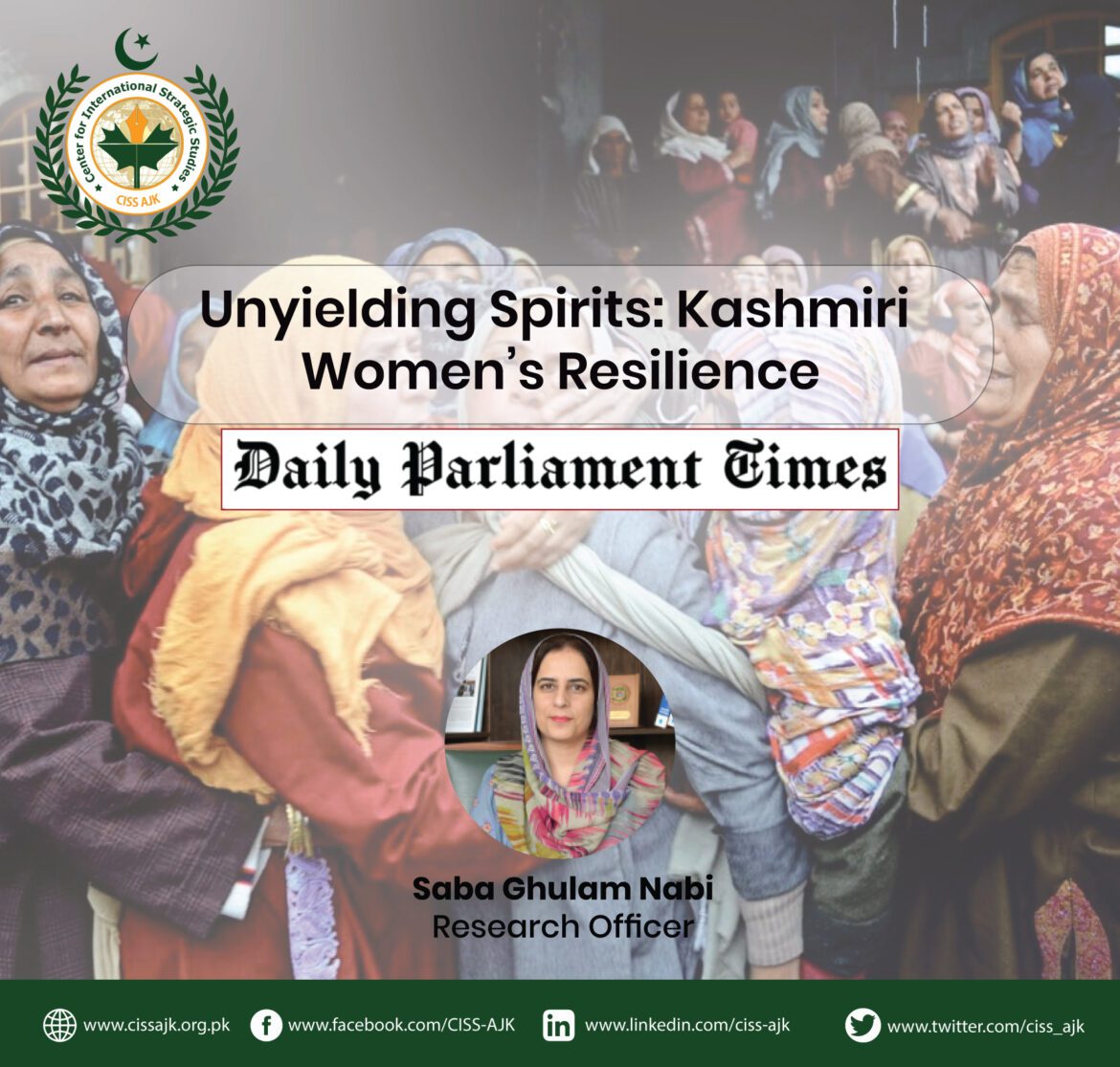448
Resistance and resilience are another name for Kashmiri women.Women are a necessarycomponent of society that contributes to all spheres of life. The role of women is vital in domestic, socio-cultural or political, educational, and economic reforms in society. Historically, many women in Kashmir have played vital roles in societal structures and earned recognition in a patriarchal society like that of Kashmir. The great Kashmiri author, Prem Nath Bazaz, was also famous for architect of the slogan “Kashmir belongs to Kashmiris” he has authored several books with Kashmir as the central theme one of his monumental books “Daughters of Vitasta” (A History of Kashmiri Women from Early Times to Present Day, 1959).
He highlights the mythical golden age in which Kashmiri women achieved unsurpassable glory;the book contains vignettesof outstanding women who flourished from early times in any field of social activity. Among them, the role of Lal Ded (Lalla Arifa) in the history of Jammu and Kashmir cannot be neglected. Born into a common family and married into a typical one, she used her poetry to resist societal norms and social taboos, becoming the first female poet of Kashmir. Her poetry remains unmatched and a symbol of unparalleled resistance. This tradition continued, and the fertile land of Jammu and Kashmir produced numerous women who stood strong and contributed to society’s well-being, like Habba Khatoon, Arni Maal, and Zooni Begum.
Additionally, Kashmiri politics saw valuable figures likeKota Ranithe last empress of the Hindu dynasty in Kashmir, and many Muslim women like Begam Akbar Jahan, Fatima Bibi, and Fazli Begam”. One of the most powerful kings of the Muslim Shahmiri dynasty, Sultan Sikandar, was backed by his mother (Hoora Bibi) in every endeavor. After the death of her husband Sultan Qutab-Ud-Din not only did she raise a powerful king Sultan Sikandar, but she was also the driving force behind his decisions for the state. The emergence of conflict in society further shaped and nourished the character of women as symbols of resistance, leading them to take the lead on several occasions. The conflict gave them a dual role: contributing to the freedom movement while also surviving the trauma inflicted upon them in multiple ways. The “half widow,” a unique concept found in Indian illegally occupied Jammu and Kashmir, refers to women whose husbands disappeared during the conflict, leaving them unsure of their fate.
Rape victims have endured the worst forms of trauma. Kashmir has witnessed several episodes of “Mass rape” e.g. Kunan Poshpora mass rape, Wavoosa Mass Rape, Chak Saidpora Mass Rape and many more rape casesleaving thousands of women in perpetual pain. The rape victims of Kunan-Poshpora were still waiting for justice despite the passage of 33 years, hundreds of cases of rape and harassment against Kashmiri women were reported in which not a single Indian army personnel has been held accountable for this heinous crime.Women in Indian Illegally occupied Jammu and Kashmir have suffered terribly at the hands of Indian occupation forces, and they were subjected to worst kind of physical and mental torture. In a patriarchal society like South Asia, rape victims are ostracized, considered “sinful,” or objectified. The trauma of being raped clings to their lives, and everyone associates them with that incident.
However, several examples exist of women participating in the resistance movement shoulder-to-shoulder with their male counterparts. Parveena Ahanger, whose son disappeared during the movement, embodies the face of non-violence in Kashmir. She tirelessly fought for any news of her beloved son, her struggle culminating in the formation of an association for families of missing persons in Kashmir. In her small two-room house, she accommodates and supports these families, raising her voice not only for her son but for the sons of thousands of Kashmiri families. Her work has gained international recognition, and though she couldn’t bring back her son, her resilience has shaken castles of Chanakya streets many times. In the ongoing uprising in Indian Illegally occupied Jammu and Kashmir, numerous Kashmiri women have emerged as prominent figures, motivated by the circumstances and their desire for freedom.
Women like Fareeda Behan ji and Asia Indrirabi and many other, have actively participated in resistance politics, experiencing the oppressive tactics of the Indian government. They faced harsh laws and endured imprisonment, separated from their families and loved ones, yet they never abandoned their struggle. Moreover, they have sought justice for the victims of Indian brutality in Kashmir, notably highlighting the buried case of Kunan Poshpoora’s “Mass rape” and urging for transitional justice for its victims. While this case has not reached its final resolution, it serves as a poignant reminder that Kashmiri women refuse to forget or let go of their suffering.
It is quite ironic that Indian state, which gives a notion of being a progressive society is using rape as a weapon of war against Kashmiris in a merciless manner.Despite the Indian government’s cruel tactics, the struggle in Indian Illegally occupied Jammu and Kashmir continues, with women participating in every aspect alongside their male counterparts. Whether in academia, politics, or societal roles, Kashmiri women remain resolute in their stance. Surviving the trauma and continuing the struggle define the ultimate pinnacle of resilience. And that is the enduring characteristic of Kashmiri women.

